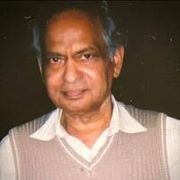
Jyotirindra (“Jyoti”) DasGupta
Professor Emeritus of Political Science
Dr. Jyotirindra (“Jyoti”) DasGupta, Professor Emeritus of Political Science, passed away peacefully at age 88 on March 17, 2022. Professor DasGupta arrived in Berkeley from Kolkata, India, as a doctoral student in August of 1961. After completing his PhD., Professor DasGupta joined the faculty in 1965, and retired as a full Professor of Political Science in 1995. Prior to immigrating to California, Professor DasGupta was both a witness to and participant in India’s independence movement, including attending Gandhi’s civil-action meetings and, as a college student, working towards the country’s democratization.
Professor DasGupta was an accomplished scholar of the politics of the developing world. As described by Professors Anshu Chatterjee and Jugdep Chima in a recent issue of Political Science Today, DasGupta’s “first major book, Language Conflict and National Development: Group Politics and National Language Policy in India, remains a foundational work for understanding the use of language identity during the mobilization for India’s partition by various political groups and, more importantly, how supposedly divisive ‘language conflicts’ actually became instrumental in integrating various linguistic groups into post-partition democratic India. His deep research revealed nationalistic dynamics in the pre-partition phase that shaped the unfolding of the partition and made Urdu, a minority language, an official language of Pakistan and Hindi an ongoing contentious issue in India. The linguistic reorganization of Indian states, he demonstrated, was eventually central to the construction of an overarching and integrative Indian national identity after partition. His research remains critical for understanding the role of language in Indian politics.”
Professor DasGupta’s scholarly output was indeed prodigious and includes his 1982 volume, Authority, Priority, and Human Development, which examined development in postcolonial rural India. Professors Chatterjee and Chima continue: “Over his long and illustrious career, professor Das Gupta also produced important articles and book chapters on numerous topics relating to Indian politics, nationality construction, and federalism. This included scholarship on the effects of multi-layered federalism in accommodating insurgent ethnic groups in the Northeast, the role of intra and inter-group bargaining within a democratic political context to facilitate postcolonial nation-building in multicultural India, and the impact of various forms of political leadership in either escalating or ameliorating ethnic conflict/separatism in postcolonial societies. In recent years, he continued to write on important contemporary movements such as the Right to Information (RTI) and its relationship in democratic development and elections in India.”
His accomplishments were many, among them establishing and chairing the Development Studies program, his groundbreaking work on language politics and ethnicity in South Asia, and his work with the Center for South and Southeast Asian Studies (now the Institute for South Asia Studies), which he also chaired for a short time. He served in the Faculty Group in Asian Studies and on the board of the journal Asian Survey for many years as well. As Professor Emeritus, he kept up in his field, published regularly, and advised graduate students for decades after his official retirement. A cherished mentor until the very end of his life, Professor DasGupta was a fixture at the old Social Science Building, where he spent nearly 60 years walking the halls.
He is survived by his wife of 57 years, Rupasree, daughter Modhurima (“Rima”), son-in-law Jonathan Eldridge, and his beloved granddaughter, Mira.
Serena Groen
Adapted by Andrew Bradt
